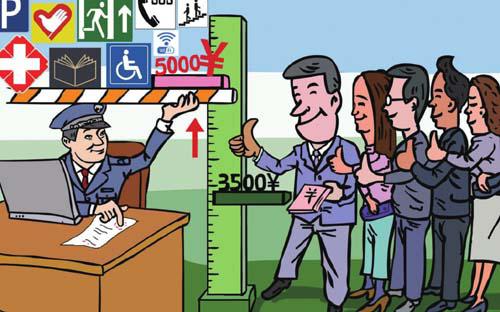How Will a Tax Overhaul Affect People’s Lives?
2018-07-26

Chinas personal income tax threshold is expected to rise to 5,000 yuan ($776) per month from the current 3,500 yuan($544), according to a draft amendment on the Individual Income Tax Law recently submitted to the countrys top legislature, the Standing Committee of the National Peoples Congress. The amendment is the seventh tax overhaul since the personal income tax code was issued in 1980.
For the first time, taxation is expected to cover all personal income, including income from personal services, rewards, as well as writers royalties. Certain items will also be included as personal tax deductibles, including the cost of childrens education and continuing education, medical fees for major diseases, and interest on housing loans as well as housing rent.
This tax code revision has stirred up wide discussion across society. Currently, personal income tax is the third largest tax item following value-added tax and corporate tax. It serves as an important tool to balance social wealth, as well as stabilize and promote economic growth. The role of taxation in improving peoples livelihood and ensuring social equality cant be undervalued. Chinas current personal income tax system, in effect since January 1, 1994, seem increasing out of pace with the countrys economic and social progress, despite continuous adjustments and reforms. People have been calling for a new personal income tax cutoff point and a new set of deduction items for many years now.
Since its announcement, the draft amendment has been widely applauded as an effective way to reduce wealth distribution inequality in the current Chinese economy. In particular, anti-avoidance clauses and supplemental deduction items are being highlighted by the media. Moreover, the way the reform should be effectively carried out to make taxation better and more effi cient is also a big topic of discussion among the public.
A move to benefit more
Fan Dayu (China Youth Daily): Individual income tax is closely related to everyones immediate interests, and thus the draft amendment has received wide attention. The public is most concerned about the income tax threshold. The cutoff point is a fi xed fi gure for a period of time, and is thus easily detached from everchanging commodity prices and the publics income levels. The 3,500-yuan threshold is obviously lagging behind the surging economic growth that China has seen in the past decade. To raise the cutoff point to 5,000 yuan, as the draft amendment proposes, will greatly relieve the middle- and low-income classes taxation burden and help to increase their income and boost societys consumption capacity.
Individual income tax helps to adjust wealth distribution and balance social wealth. Highincome earners have the obligation to pay more taxes. However, in China, high-income earners tax payments are disproportionately low, while middle- and low-income earners are burdened with relatively high taxes. The reason for this inequality lays in taxation classification practices. According to the current individual income tax code, taxes fall into 11 categories, with different deduction standards, tax rates and tax computation methods. Ordinary people tend to have one single income source, namely, salaries or wages, making it easier to cover them with taxation rules. High-income earners, however, usually have more than one income source, making the current taxation classifi cation ineffi -cient for collecting their taxes and leading to tax evasion and fraud.
This upcoming tax reform will create space for tax reduction for ordinary people while also establishing a general framework for an individual tax system suited for the future. With the deepening of the individual income tax reform and the improvement of the credit system, the reform will help to promote social equality while encouraging more people to increase their incomes through hard work in a more egalitarian society.
Zeng Jinhua (Economic Daily): Currently, individual income tax is Chinas third largest tax only after value-added tax and corporate tax. As we enter a new era and encounter new situations, to push forward the reform on individual income tax is becoming urgent. This amendment draft has taken into account successful personal income tax practices and experiences in other countries. It has also taken into full consideration Chinas reality, focusing on peoples welfare.
The reform aims to transform the taxation classifi cation into one composed of a synthesis tax system and a classifi cation system, which is a common practice in the world. In addition, tax deductions will be applied to many items, such as the cost of childrens education and continuing education, medical fees for major diseases, interest on housing loans and other loans. Moreover, the anti-avoidance clause in the draft will prevent individuals from dodging taxes and fi ll other loopholes.
The reform will raise the requirement for taxation authorities capabilities and techniques for managing the new situation. Law enforcement should also be stepped up to punish tax evasion and fraud. At the same time, the publics awareness of the taxation law should also be enhanced. They must strictly follow the law to pay taxes accordingly. A good taxation system will only bring benefi ts if efforts are made on all fronts.
Balance of social wealth
Shi Langdu (Peoples Daily): Every time the cutoff point of personal income tax is raised, a new host of people stand to benefi t. However, the ever-rising overall income level will gradually decrease the number of people benefi ting from previous tax threshold increases. According to statistics from the Ministry of Finance, the governments personal income tax revenues jumped by 18.6 percent year on year in 2017. The fact that the personal income tax increase overtook personal incomes reveals that Chinese people are becoming richer. But at the same time, it also implies that to make taxation a tool for balancing social wealth, the system of personal income tax must keep up with the times.
Seven years have passed since China raised the threshold for personal income tax. Every time, the cutoff point has been fi xed based on full consideration of peoples expenditures on housing, education and medical care, so that their lives could be improved. This time, the newly-added deductible items such as education costs and medical fees for major diseases, are a big step forward and will surely cover larger groups of people, exempting more people from having to pay personal income tax.
One thing is certain, with fewer taxes to pay, people will have more money to spend. In this sense, a higher threshold for personal income tax will directly spur domestic consumption, indirectly boost the countrys employment and strengthen the mid-income class.
However, a higher cutoff point in personal income tax is not necessarily a good thing; there must be a balance between equality and efficiency. On the one hand, there should be equilibrium between the state treasury and individual wealth. The former backs a countrys overall development. To a certain extent, how to best spend tax revenues so that they can best benefi t the whole population is even more important than taxation itself. On the other hand, in order for personal income tax to really help to adjust income distribution and narrow the gap between rich and poor and bolster social fairness, the cutoff point should be fi xed in a way that will make middle- and low-income earners lives easier. Therefore, apart from a raised threshold for personal income tax, tax deductions and even a cut to the rate of indirect taxes are also very important.
Gao Lu (Qianjiang Evening News): Families in different economic situations react differently to a similar amount of debt. The same is true for individual income tax.
Compared with the past one-size-fits-all taxation method, the revised taxation scheme will undoubtedly be more flexible and cater to individuals personal conditions. A scientific and objective calculation of a persons actual income should be based on both income and spending. Thus, if individual income tax is set on this basis, it will be more apt to be able to balance social wealth distribution.
Meanwhile, this taxation overhaul will also transform the way of collecting personal income tax, which requires adaptation from both individuals and taxation authorities. As a result of the inclusion of deduction items, individuals will need to prepare various materials to submit to taxation authorities. These new materials and subsequent procedures will inevitably increase the burden on taxation authorities. Thus, relevant authorities should begin to work out the schemes to cope with this rising workload ahead of time.
